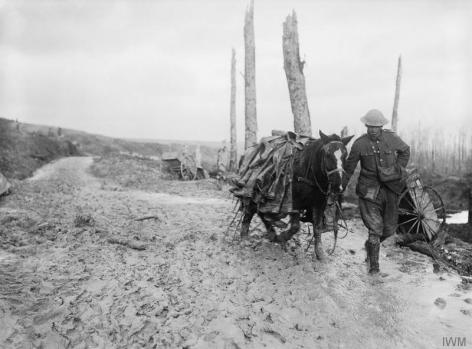During the Great War, the horse was essential to military efficiency. Horses hauled artillery guns, transported vital supplies and ammunition, and carried men into battle. The military horse was, in fact, a weapon. Many thousands of horses were purchased and supplied to the British Expeditionary Force at great expense, because without them an Army could not function. Although the British Army was the most modern of all the belligerent forces during the Great War, the horse was nevertheless favoured because of its reliability and versatility. For example, horses coped much better than motor vehicles where the going was difficult. It was horse-power that ensured the Army’s lines-of-communication were maintained. Indeed, without an adequate supply of horses it is probable that the British Army would not have achieved victory in 1918.
However, the military horse was also a weapon which quickly broke down when it was not properly maintained. The British Army had learned this to its cost during the Boer War, when more horses had been killed by bad management than by enemy action. Good horse management in the field depended upon the soldier. It was essential that he had received adequate training, and it was also essential that he take responsibility for his horse’s well-being. During the Great War, all soldiers given ‘ownership’ of a horse were taught to put their horse’s needs before their own, and to always think first of their horse. They were taught to see their horse in the same way as an infantryman would his rifle; as something he may have cause to rely upon and which it was therefore in his best interests to look after. The soldier-horse relationship developed once the soldier’s care became one of sympathetic consideration. Soldiers and their horses spent most of their lives together when on active service, and it was this close proximity which helped to bond them into a unit. Many soldiers came to see their horses as comrades; they named them, and went to great lengths to protect their horses from harm. From the Army’s perspective, the soldier-horse relationship ensured that an expensive military asset was properly maintained.
At home, portrayals of the soldier-horse relationship extended its vital contribution to the war effort beyond the battlefield. For example, images and stories that told of the soldier’s kindness to his horse bolstered a positive illusion the British had of themselves as a people capable of both strength and compassion. Images of the soldier-horse relationship played an important part in helping the British people to imagine war. They also provided much-needed comfort and reassurance when friends and loved ones were in danger. Importantly, by studying these portrayals dispassionately, we find that they were never entire flights of fancy, and often bore more than a passing resemblance to the soldier’s actual experience. Indeed, it becomes possible to question whether sense and sentimentality ever did entirely part company in the British imagination. Like their flesh and blood inspiration, portrayals of the soldier-horse relationship have not received the attention they merit. By rectifying this oversight, this thesis not only contributes to study of the horse-human relationship, but also to our knowledge of the Great War. Not least, because we achieve a better appreciation of what it was like to live in the War’s shadow.
Access to my thesis is available via The University of Derby’s online repository:
https://derby.openrepository.com/derby/handle/10545/621040
Or go to my page on academia.edu and follow the links:
https://janeflynn.academia.edu/
Note that any reference to the abstract or thesis must be properly attributed and cited.


I once researched a veterinary prize medal. The recipient had left university in 1914 and gone to France with the Army Service Corps, where he won the MC. He was then removed from the army and sent back to university to complete his studies as a vet and completed the war on horse transports bringing horses from the USA. At that point I realised how seriously the army took its supply of horses.
LikeLike
Yes, absolutely! The supply of horses was absolutely essential to military efficiency and veterinarians and other knowledgeable personnel were much in demand. I know a lot of veterinary students joined up and that many were sent back to University to compete their training by the Army. Popular thinking on the war horse tends to focus only on their death and suffering. However, this was avoided as much as was at all possible. After all, winning the was was all about keeping horses (and men) alive and well so that they could “do their bit’! Thanks for your interest!
LikeLiked by 1 person
It’s nice to know someone is researching such things. On the other side, my grandfather was seriously injured when one of his gun horses kicked him in panic. That’s just one of several horse injury stories I’ve heard over the years. 🙂
LikeLike
Thank you! Accidents were quite common I think, and often sustained when handling horses on the ground. Horses can be dangerous at the best of times. I’ve read accounts of all sorts of accidents and injuries; some fatal. Thanks for sharing your Grandad’s story. Do you have any written diaries or memoirs?
LikeLike
Awsome blog! I am loving it!! Will come back again. I am bookmarking your feeds also.
LikeLike
Good day! I know this is kinda off topic but I’d figured I’d ask. Would you be interested in trading links or maybe guest authoring a blog article or vice-versa? My site addresses a lot of the same topics as yours and I feel we could greatly benefit from each other. If you are interested feel free to shoot me an e-mail. I look forward to hearing from you! Awesome blog by the way!
LikeLike
Hi Suellen,
Sorry not to have replied sooner. Are you still interested in a collaboration, and what did you have in mind?
Best wishes,
Jane
LikeLike